Sri Lanka team bus attack 10 years on: Trevor Bayliss and Paul Farbrace on their survival
- Published
Download and listen to the full interviews with Trevor Bayliss and Paul Farbrace, available as a Test Match Special podcast. This article was initially published in March 2019.

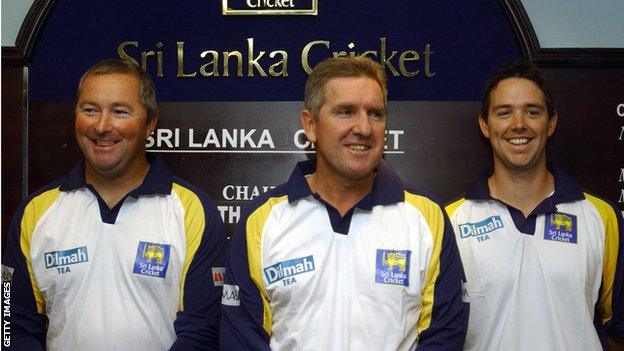
Paul Farbrace (left) and Trevor Bayliss (middle) joined Sri Lanka in 2007
On 3 March 2009, the Sri Lanka cricket team were in Lahore, Pakistan. It was the third morning of another Test match. Shortly before 9am local time, just outside the Gaddafi Stadium, 12 gunmen ambushed them.
Six policemen and a driver escorting match officials were killed. The attackers were armed with assault rifles, grenades and rocket launchers.
Here former England coach Trevor Bayliss and his assistant Paul Farbrace, both then working with Sri Lanka, were on the team bus. Here, 10 years on - and as Pakistan prepares to host its first Test since - they explain how they survived.

Farbrace: We were quite a superstitious team. We always had the same seats in the bus. I was always three back, on the right-hand side as you got on.
That morning I had my back to the window with one of my legs up on the other seat. I was cleaning my sunglasses, chatting to Trevor over the aisle about what we were going to say to the bowlers that morning.
The next thing, the bus jolted and came to a stop pretty quickly.
I turned and looked out the window over my shoulder. I could see this guy moving towards us with a gun, firing this gun.
I then looked down the front of the bus and I could see the top of a white car which had been driven onto the roundabout to block us. The next thing the bus shook again quite violently.
The Sri Lankan guys on the bus had seen bomb attacks. They were aware of bomb attacks and were probably quicker to get down. I think I was thrown to the floor with the jolt as people were shouting to get down.
Once I hit the floor, there was quite a significant amount of blood around me. I didn't know where it had come from until I realised I had a thick piece of metal sticking out of my forearm.
Bayliss: I'd woken up with a bit of a headache so I was lying back on my seat with my eyes shut. I would usually be sat two back from the driver, and Tillakaratne Dilshan was in the seat in front of me, just behind the driver.
All of a sudden there was this explosion, not that close but close enough that it got your attention. Within a few seconds another hand grenade or something went off next to the bus.
I was half asleep. By the time I moved, everyone was on the floor in the middle of the bus. I just jumped down between the seats.
There was a big roundabout next to the ground and Dilshan later said there'd been a white vehicle reversing through it that pulled up in front of the bus.
Some guys got out and were shooting at the police in the van in front of us. There were others waiting in the middle of roundabout too.
Farbrace: The grenade injured us, pieces of metal in our bodies, pieces of the bus that came in.
Ajantha Mendis, who was in the seat in front of me, he'd fallen to the floor as well and was bleeding quite significantly from the back of his head.
On my side of the bus there was Mendis in front of me, myself, then Tharanga Paranavitana who was sat behind me. He had shrapnel in his chest and had passed out.
His white training shirt was soaked in blood. He'd passed out on his seat and the physio and the trainer opposite pulled him down by his legs to get him down on the floor.
Then behind them was Kumar Sangakkara and Thilan Samaraweera who were sat together.
As Sanga fell to floor Samy fell on top of him and his backside was in the air. He was hit by a bullet, it went in at the top of his thigh.
Bayliss: I was crouched down between the seats with my head facing the outside of the bus, I could sort of see back underneath between my legs the guys lying down in the aisle.
Farby was right behind and he had a piece of shrapnel sticking out of his arm, I could see the blood trickling down.
The calmness on the bus was one of the things that stood out to me. The only thing being said was quietly: 'I'm hit', 'So am I.' Time seems to stand still in that sort of situation.
There was nothing you could do. You just had to get low, get your head down.
The bus driver had jumped on the floor as well and then someone was shouting out to get the bus going but there were still bullets flying through the glass.
Farbrace: I didn't think about dying. I wouldn't even say I was scared. Looking at the arm I was just thinking 'please don't hit me again. I don't want to be hit again'.
The seat where Trevor had been sat, there were three bullet holes in the window. He'd got down and put his rucksack with his computer in it up against the window to give himself a bit of protection.
Bullets were hitting the bus but everybody was incredibly calm. It was an eerie calm. There were bullets pinging the bus, hitting the glass, but the only voice I could hear was Dilshan's. It was a very distinctive voice. I can still hear it now, I probably will for the rest of my life.
He would always sit right behind the driver. I could hear him shouting to the bus driver to reverse. The driver had got himself under the steering wheel and was steering with his arms above his head.
He'd started to reverse back like this while Dilshan was the one popping his head up and giving him directions to get away from the attack.
The driver was given huge credit, and his skills in getting us out of the situation were incredible, but to this day I think Dilshan's bravery saved our lives. Sticking his head up and talking the driver through it, telling him where to turn, that probably saved us.
It seemed like this all lasted ages but it probably was only seconds, maybe a minute and a half, I don't know. That's the one area that to this day I've never been clear on - how long the whole thing took.
Bayliss: Some said it went on for 10 minutes but in reality, it was probably a minute or two at the longest. Time stands still in that sort of situation.
We were 30 seconds or so from the stadium and so once we took off it wasn't too long before we got to safety, but we could still hear the gunshots.
Luckily nobody from our tour party was killed but half a dozen policemen and another driver were. There is footage I think someone took with a phone of the umpires with their little white van being shot at right behind us.
Once we got into the ground we felt a lot safer, and it was more about trying to look after the guys who had wounds.
There was a feeling of relief to begin with, for a few of the guys that quickly started to turn into anger, especially when the Pakistani authorities came in and said everything was OK. Quite clearly it wasn't OK. It was like an army hospital.
Farbrace: There was a lot of blood. Once we got into the changing room, with medical people coming in, officials coming in, that's when the level of anger and distress among us really started to hit home.
Seeing people in our team laying on the physio beds bleeding and injured, in distress and in pain, that's when we all started to realise how bad the situation was. Ajantha Mendis had somewhere in the region of 16-20 pieces of metal taken out of his head.
They tried to take us out to hospital by ambulance, but I flat out refused to go back out there, there was no way I was going anywhere by road. But Thilan [Samaraweera] and Para [Paranavitana] had to be taken because their injuries were serious.
The two guys were taken off and then, with the TVs on, watching the news in the changing rooms, they showed this picture of an ambulance with bullet holes in it and the doors blown open. We thought it was the one that had taken the players away but it was quickly proved it was one that had been in our convoy. There was a lot of emotion.
Chris Broad, the match referee, came into our room and his white match shirt was covered in blood. His face was white. He and the umpires, they'd been in a small minivan. We were in a good sized coach, high up and with some kind of protection. They had literally nothing.
Their van driver was shot and killed, the fourth umpire Ahsan Raza was shot in the back. They'd been through an unbelievable experience as well.
Steve Davis, another of the umpires, he had a bullet hole through the flare of his trouser leg. They'd managed to get away after a policeman got in and drove the van out for them.
Bayliss: I rang my wife and she was just picking the kids up from school, it was about 3pm in Australia.
Luckily I was able to speak to her because the news had been reported very quickly, and back in Australia they were saying the Sri Lankan coach had been shot - they didn't use the word bus but coach. Thankfully I'd spoken to her by the time friends were ringing her asking if I was OK.
We were in the dressing room for about five hours. Then they got two big Chinook helicopters to land on the pitch and pick us up. That trip was a little daunting as well, we weren't exactly sure what was happening.
We took off at about 2:15pm, and it was a 15-minute flight to an air force base. The Sri Lankans sent an airplane with some doctors and nurses and a few of the administrators and management too.
We then took off from there at about 10 at night and flew straight back to Colombo in Sri Lanka.
Farbrace: That was the most nervous time, when we were in the helicopter.
There'd been talk of a handheld rocket launcher being fired and going over the top of the bus before, and I thought: 'Are they going to attack again?'
Even when the plane took off I was really nervous until we got to a height where I thought we'd be safe.
Most of us spent at least a week in hospital in Colombo. It became a bit of a hub. Ajantha Mendis used to come and sit on the spare bed in my room, some of the other younger lads too, and we'd spend a long time chatting.
There's a very close bond behind those of us involved in the incident, and that is something you will never lose. That panic and fear we all had.
There are always going to be the tough memories. And the attack definitely had an effect on me and the way I was for a period. Probably for four months I slept with the light on. I didn't like people walking behind me. After a while you go back to normal, if there is a normal.
But I saw Ajantha recently and he said he remembered a time when a load of firecrackers went off outside the hospital window and I'd jumped under the bed because I was so nervous. It was the first time since the attack that we'd all laughed, he said. One small piece of humour in a really emotionally tough experience to go through.
It was horrendous and people died. It just shouldn't have happened, that people died trying to help us get to a match of cricket.
I have no anger or bitterness, just a deep sadness for the people who died. They weren't going to war, they were just guiding us through what has always been to me a very lovely city in Lahore. That sadness I think will stay with me forever.

Download and listen to the full interviews with Trevor Bayliss and Paul Farbrace, available as a Test Match Special podcast.
Paul Farbrace shares his first-hand account of the Lahore terror attack in 2009.

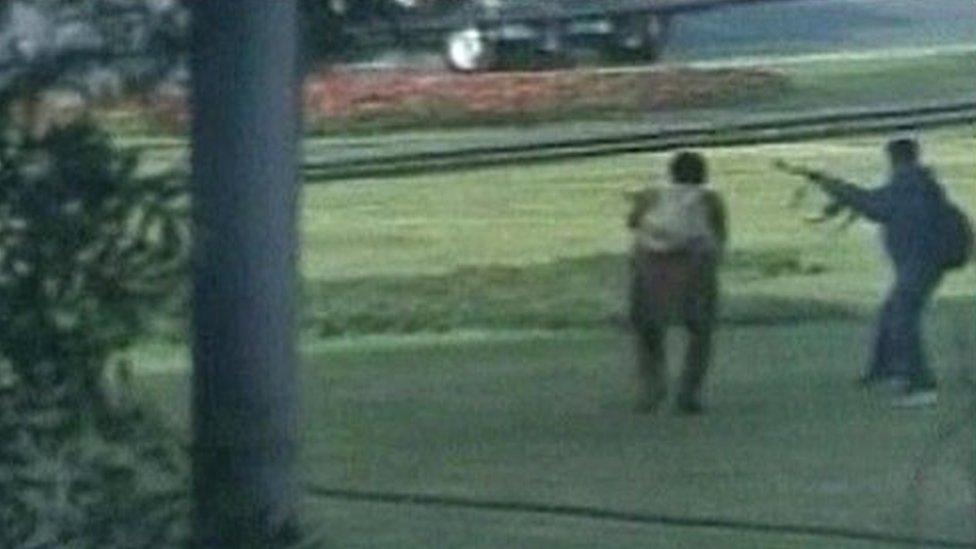
The attack took place about 500m from the cricket ground, at Liberty Square
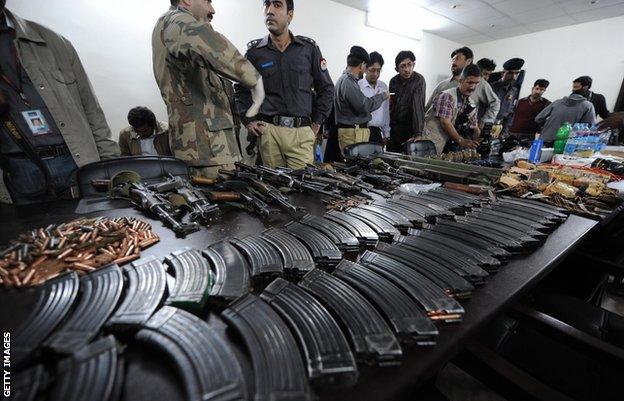
Pakistani security officials display the weapons used by the gunmen. Following the attack, the New Zealand team cancelled its December 2009 tour. Pakistan was also stripped of 2011 Cricket World Cup co-hosting rights
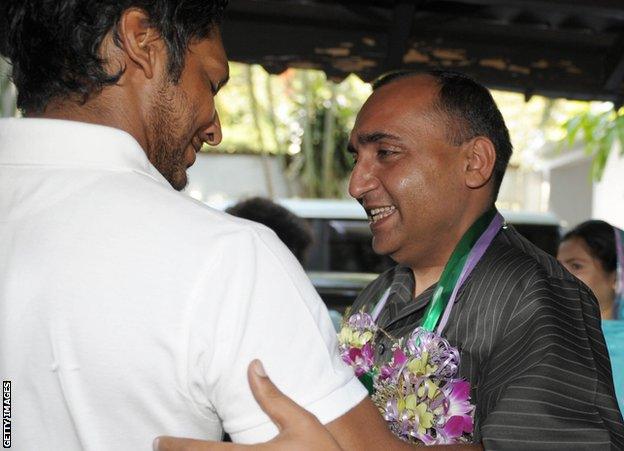
At a ceremony in Colombo one month after the attack, former Sri Lankan captain Kumar Sangakkara (left) greets Mohammad Khalil (right), the Pakistani bus driver who helped them to safety
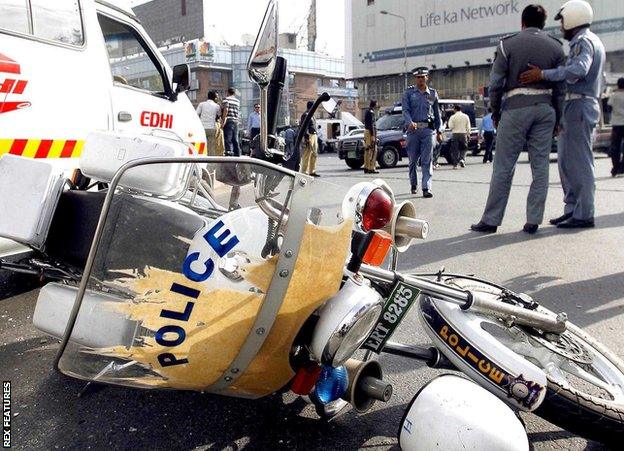
Pakistan hosted no top-level international cricket for six years after the attack. Zimbabwe became the first Test-playing nation to visit since when playing two T20 matches and three one-day internationals in 2015
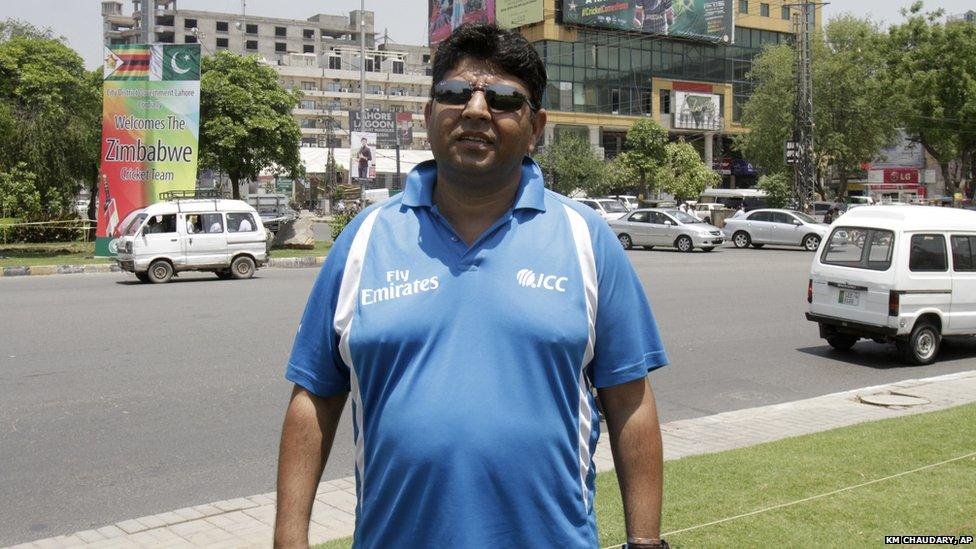
Pakistani umpire Ahsan Raza, who was shot twice in the 2009 attack, officiated during the 2015 Zimbabwe tour. That series was completed despite a suicide bomb attack taking place outside Lahore's Gaddafi Stadium two days before the final match
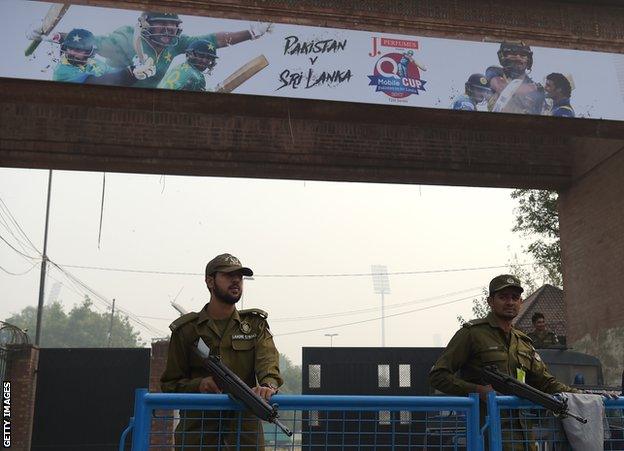
Sri Lanka returned to Pakistan and to Lahore's Gaddafi Stadium for the first time since the attack when they played a T20 match on Sunday, 29 October 2017